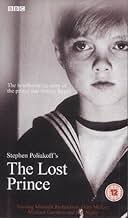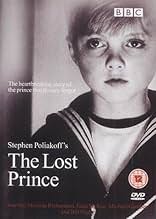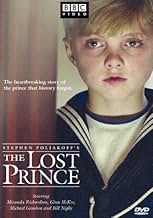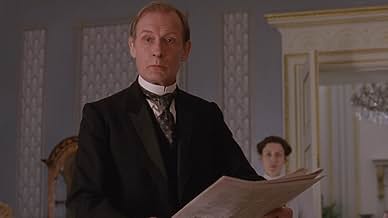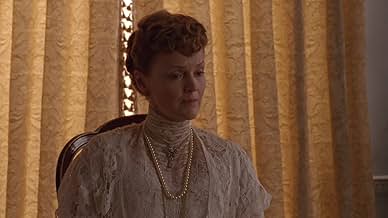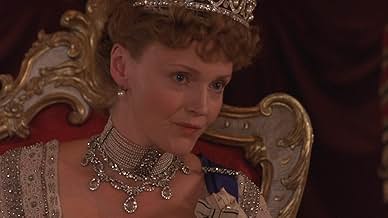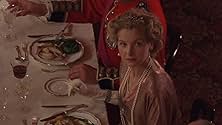CALIFICACIÓN DE IMDb
7.6/10
2.2 k
TU CALIFICACIÓN
La historia del príncipe Juan, el hijo menor autista y epiléptico de la reina María y el rey Jorge V, que pasó toda su vida oculto a la vista del público y murió a los 13 años en 1919.La historia del príncipe Juan, el hijo menor autista y epiléptico de la reina María y el rey Jorge V, que pasó toda su vida oculto a la vista del público y murió a los 13 años en 1919.La historia del príncipe Juan, el hijo menor autista y epiléptico de la reina María y el rey Jorge V, que pasó toda su vida oculto a la vista del público y murió a los 13 años en 1919.
- Ganó 3 premios Primetime Emmy
- 8 premios ganados y 21 nominaciones en total
Explorar episodios
Opiniones destacadas
10Alex-372
The Lost Prince is a beautiful costume drama from Stephen Poliakoff, about the young brother of prince George, who nobody wanted to talk about and who was most likely autistic and most definitely epileptic, diseases respectively unknown and misunderstood at the time.
This story is roughly told through his eyes, and describes in beautiful detail the transition of Europe from a continent ruled by related monarchs (many of them Saxe-Coburg and Gotha), until the end of this system during and after WWI. As important historical events manage to find their way into palace life (the suffragette movement, the rise of ordinary people as politicians, the telephone and the motor car), they more often seem like foreign intrusions into the world of the palace.
As this is seen through the eyes of the little boy, there is very little value judgement as to whether this system was a right or just one, and at the end you are struck with the horror of the murder of the tsarist family and their beautiful daughters, but we never see the reign of terror they themselves and their secret police visited upon Russia.
There is a very funny incident when the tsarina during a visit to what she sees as her poor cousins estates, refuses to walk any further, because she has the "wrong shoes" for walking in the grass. Later, she remarks how "close" the houses of "other people" are and you can't help conclude she was simply afraid of being killed by the proletariat. :-)
Very well acted by Miranda Richardson (Blackadder), Michael Gambon, Tom Hollander, Gina McKee as the governess Lalla but especially by the two child actors who play Johnny. They look like great kids rather than brats.
Highly recommended if you can catch this on the BBC or HBO.
This story is roughly told through his eyes, and describes in beautiful detail the transition of Europe from a continent ruled by related monarchs (many of them Saxe-Coburg and Gotha), until the end of this system during and after WWI. As important historical events manage to find their way into palace life (the suffragette movement, the rise of ordinary people as politicians, the telephone and the motor car), they more often seem like foreign intrusions into the world of the palace.
As this is seen through the eyes of the little boy, there is very little value judgement as to whether this system was a right or just one, and at the end you are struck with the horror of the murder of the tsarist family and their beautiful daughters, but we never see the reign of terror they themselves and their secret police visited upon Russia.
There is a very funny incident when the tsarina during a visit to what she sees as her poor cousins estates, refuses to walk any further, because she has the "wrong shoes" for walking in the grass. Later, she remarks how "close" the houses of "other people" are and you can't help conclude she was simply afraid of being killed by the proletariat. :-)
Very well acted by Miranda Richardson (Blackadder), Michael Gambon, Tom Hollander, Gina McKee as the governess Lalla but especially by the two child actors who play Johnny. They look like great kids rather than brats.
Highly recommended if you can catch this on the BBC or HBO.
10kos5
The Lost Prince is one of those wonderful pieces that you rarely see. Beautiful, touching, moving, and heartbreaking are only a few words to describe it. It was informative also because I had never before known of the epileptic Prince John. I fell in love with Johnny the first time I saw him.
The acting was fantastic. I loved Lalla. Gina Mckee did an excellent job in portraying her. Miranda Richardson(Queen Mary) also did a wonderful bit of acting as the seemingly heartless Queen. I was reduced to tears at the end.
If you've never heard of the wonderful little Prince, or you'd just like to watch a different perspective on the Royal family, see the The Lost Prince, you'll be glad you did.
The acting was fantastic. I loved Lalla. Gina Mckee did an excellent job in portraying her. Miranda Richardson(Queen Mary) also did a wonderful bit of acting as the seemingly heartless Queen. I was reduced to tears at the end.
If you've never heard of the wonderful little Prince, or you'd just like to watch a different perspective on the Royal family, see the The Lost Prince, you'll be glad you did.
This lavish production, uses the vehicle of the short life "The Lost (from history) Prince" to portray what Royal Life was like at the turn of century. The sumptuous production illustrates the splendour, luxury, misery and ultimately the futility of the Royals. There are wonderful images of the beautiful daughters of the tsar. Epileptic Prince John is however seen as the only one as being allowed to be himself. Wonderful performances of the roles of the ice queen Queen Mary, Lalla the nursemaid, Prince John young and old.Has been criticised for being too long, but you must try and get to see this when it comes to your country.
Historical facts, Prince John died aged 14 isolated from his family in a farmhouse at Sandringham? cared for by Lalla Bill. Only one historical reference to him still existed. The height of George V is still a secret.
Historical facts, Prince John died aged 14 isolated from his family in a farmhouse at Sandringham? cared for by Lalla Bill. Only one historical reference to him still existed. The height of George V is still a secret.
I was very much moved by this movie about the youngest child of King George V (1911-1936) and Queen Mary. The young Prince John was largely kept out of the public eye because he was thought to be an embarrassment to the Royal Family.
The Prince was diagnosed with epilepsy by his doctors and because of this and his learning disabilities, he was dismissed by both doctors and teachers as a child with little potential and a liability to the Royal Family. In fact, the young Prince was capable of learning as his governess, played by Gina McKee, was able to prove. It is quite likely that he had autism, a condition that makes social interaction difficult but is not a sign of low intelligence. In fact, with proper guidance and some understanding, he was shown to have exceptional talent, not unusual with autism.
The Prince was used to spending much of his time at Sandringham, the royal estate in Norfolk and home of his grandmother Queen Alexandra, which was where he enjoyed his own private garden. He also had a strong friendship with his slightly older brother Prince George, later the Duke of Kent. This is interesting because George was something of a pariah himself as a young man but later became an important working royal with his wife Marina and their children by his side.
What I found most unsettling was the distance between John and his parents George V and Queen Mary. The King and Queen performed their official roles very well but ran a tight ship, which put a lot of pressure on their children. Whether true to life or not, King George is shown as a high strung monarch, who was incapable of acting naturally with his youngest son, to the point of unleashing outbursts of anger towards John. John's grandfather Edward VII showed far more understanding of John but he died when John was only five. One can imagine that life with the grandparents - Edward VII and Queen Alexandra - would have allowed John an easier childhood.
Queen Mary, a tower of strength to the the Royal Family for almost 60 years, seemed incapable of showing any personal affection. When tears welled up in her eyes, you could see her sorrow but she was incapable of hugging him or speaking to him as a loving mother. Queen Mary felt constrained by her role. She showed anger towards the governess whenever John without warning, appeared in front of the public or government officials. In fact, as governess, it was Gina McKee who showed great understanding and took great pride in young John's progress.
The movie seems to have a layer of truth as the story of a special needs child, who is subjected to pressures and misunderstandings as a member of the Royal Family. This is the flip side of the life of privilege. The one bright light in his short life was his governess who was able to draw out his overlooked talents and impart to him some measure of happiness despite his imposed seclusion.
The Prince was diagnosed with epilepsy by his doctors and because of this and his learning disabilities, he was dismissed by both doctors and teachers as a child with little potential and a liability to the Royal Family. In fact, the young Prince was capable of learning as his governess, played by Gina McKee, was able to prove. It is quite likely that he had autism, a condition that makes social interaction difficult but is not a sign of low intelligence. In fact, with proper guidance and some understanding, he was shown to have exceptional talent, not unusual with autism.
The Prince was used to spending much of his time at Sandringham, the royal estate in Norfolk and home of his grandmother Queen Alexandra, which was where he enjoyed his own private garden. He also had a strong friendship with his slightly older brother Prince George, later the Duke of Kent. This is interesting because George was something of a pariah himself as a young man but later became an important working royal with his wife Marina and their children by his side.
What I found most unsettling was the distance between John and his parents George V and Queen Mary. The King and Queen performed their official roles very well but ran a tight ship, which put a lot of pressure on their children. Whether true to life or not, King George is shown as a high strung monarch, who was incapable of acting naturally with his youngest son, to the point of unleashing outbursts of anger towards John. John's grandfather Edward VII showed far more understanding of John but he died when John was only five. One can imagine that life with the grandparents - Edward VII and Queen Alexandra - would have allowed John an easier childhood.
Queen Mary, a tower of strength to the the Royal Family for almost 60 years, seemed incapable of showing any personal affection. When tears welled up in her eyes, you could see her sorrow but she was incapable of hugging him or speaking to him as a loving mother. Queen Mary felt constrained by her role. She showed anger towards the governess whenever John without warning, appeared in front of the public or government officials. In fact, as governess, it was Gina McKee who showed great understanding and took great pride in young John's progress.
The movie seems to have a layer of truth as the story of a special needs child, who is subjected to pressures and misunderstandings as a member of the Royal Family. This is the flip side of the life of privilege. The one bright light in his short life was his governess who was able to draw out his overlooked talents and impart to him some measure of happiness despite his imposed seclusion.
(Aired over two nights this week on the Canadian station, CBUT, which we get here in Seattle...)
Superbly photographed and exquisitely acted, this movie primarily focuses on England's Prince John, youngest son of George V and Queen Mary who, in his tragically short life, suffered not only from periodic epileptic seizures but was also handicapped by what appeared to be some form of retarded mental development.
The creators of this film were kindly and charitable in not showing the boy's ailments in too negative a light. Enough was shown though to give the viewer to understand that the poor lad had problems - so much so that his immediate family and caretakers felt that he clearly wasn't cut out for royal service. As a result he was whisked away to a sort of royal "nether-world" out in the English countryside, away from public view, where hopefully he would not become an object of curiosity, scorn, ridicule, etc.
Sad though the plight of the boy was, you couldn't help but feel that he and his dysfunctional condition was a metaphor for the plight of the entire royal or aristocratic system which held sway over most all of Europe at the time. The boy's ailments and weaknesses eventually lead to his downfall, and all of this plays out simultaneously with the royal families of Europe (most of whom are shown being connected through marriage or bloodline) attempting to cope quite ineffectually with the onslaught of the tragedy of World War One.
The film includes several scenes of interaction between the British royal family and the Russian royal family (the Czar and Czarina and their wonderful kids). They are closely related, which makes their death (or shall we say murder, at the hands of the Bolsheviks, which is graphically depicted) all the more chilling, tragic and thought provoking.
There is so much to contemplate in this movie that I'd rather not sit here and prattle on about it, but instead would rather simply recommend that people go rent a copy and just watch it. It may not be for everyone, as it is a bit long and covers many facets of early 20th century history that will glide right over your head if you weren't paying attention in history class. But even if you ignore entirely the historical aspects of the movie, it is nonetheless a very touching picture: sad, compelling, and ultimately life-affirming, with wonderful performances and beautifully photographed images that will stick in your mind for a long time to come.
Superbly photographed and exquisitely acted, this movie primarily focuses on England's Prince John, youngest son of George V and Queen Mary who, in his tragically short life, suffered not only from periodic epileptic seizures but was also handicapped by what appeared to be some form of retarded mental development.
The creators of this film were kindly and charitable in not showing the boy's ailments in too negative a light. Enough was shown though to give the viewer to understand that the poor lad had problems - so much so that his immediate family and caretakers felt that he clearly wasn't cut out for royal service. As a result he was whisked away to a sort of royal "nether-world" out in the English countryside, away from public view, where hopefully he would not become an object of curiosity, scorn, ridicule, etc.
Sad though the plight of the boy was, you couldn't help but feel that he and his dysfunctional condition was a metaphor for the plight of the entire royal or aristocratic system which held sway over most all of Europe at the time. The boy's ailments and weaknesses eventually lead to his downfall, and all of this plays out simultaneously with the royal families of Europe (most of whom are shown being connected through marriage or bloodline) attempting to cope quite ineffectually with the onslaught of the tragedy of World War One.
The film includes several scenes of interaction between the British royal family and the Russian royal family (the Czar and Czarina and their wonderful kids). They are closely related, which makes their death (or shall we say murder, at the hands of the Bolsheviks, which is graphically depicted) all the more chilling, tragic and thought provoking.
There is so much to contemplate in this movie that I'd rather not sit here and prattle on about it, but instead would rather simply recommend that people go rent a copy and just watch it. It may not be for everyone, as it is a bit long and covers many facets of early 20th century history that will glide right over your head if you weren't paying attention in history class. But even if you ignore entirely the historical aspects of the movie, it is nonetheless a very touching picture: sad, compelling, and ultimately life-affirming, with wonderful performances and beautifully photographed images that will stick in your mind for a long time to come.
¿Sabías que…?
- TriviaKing George V had six children, two of whom used the name George. His second son was Prince Albert Frederick Arthur George, known to the family as Bertie, who became King George VI. He had a bad stutter that began in early childhood and lasted into adulthood. His third son, Johnnie's closest sibling in this movie, was Prince George, Duke of Kent. He grew up to live a life that was considered scandalous, and died in a plane crash in 1942.
- ErroresWhen the Romanovs are in England, Alexandra speaks English with a Russian accent. In real life, Alexandra was a German princess raised in England by her grandmother, Queen Victoria. She spoke English with a British accent.
- Citas
Prince George: [Speaking about Prince John] He was the only one of us who was able to be himself.
- ConexionesFeatured in Masterpiece Theatre: The Lost Prince: Part 1 (2004)
- Bandas sonorasRondo for Glass Armonica
(uncredited)
Composed by Joseph Schmittbauer (as J.A. Schmittbauer)
(Queen Alexandra's birthday cake)
Selecciones populares
Inicia sesión para calificar y agrega a la lista de videos para obtener recomendaciones personalizadas
Detalles
- Fecha de lanzamiento
- Países de origen
- Sitios oficiales
- Idioma
- También se conoce como
- 失落的王子
- Locaciones de filmación
- Black Park Country Park, Black Park Road, Wexham, Buckinghamshire, Inglaterra, Reino Unido(Russian lake, royal car)
- Productoras
- Ver más créditos de la compañía en IMDbPro
Contribuir a esta página
Sugiere una edición o agrega el contenido que falta

Principales brechas de datos
By what name was The Lost Prince (2003) officially released in India in English?
Responda
